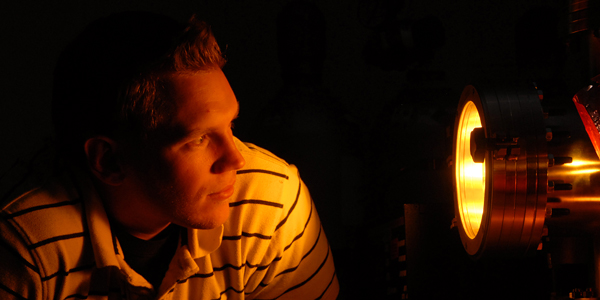Nonproliferation Work Scores $25 Million

NC State has been awarded a five-year, $25 million federal grant to develop the next generation of leaders with practical experience in technical fields relevant to preventing the spread of nuclear weapons around the globe.
The National Nuclear Security Administration’s Office of Defense Nuclear Nonproliferation Research and Development made the announcement, culminating a process that began nearly a year ago. NC State was selected over 22 other proposals.
The university’s new Consortium for Nonproliferation Enabling Capabilities, or CNEC, will serve as a research and education hub for the development of enabling technologies and technical talent in the field over the coming decade.
“For NC State to be selected to lead this vital national effort is a testament to our great faculty and strong leadership in nuclear engineering,” said Chancellor Randy Woodson. “NC State is increasingly recognized as the university of choice for government and industry partners who want to collaborate with world-leading faculty and students to solve some of our nation’s biggest challenges.”
The announcement follows NC State’s selection by the Department of Energy in January to lead a $140 million manufacturing innovation institute to develop next-generation power electronics. In August 2013, NC State was chosen by the National Security Agency to create the $60 million Laboratory for Analytic Sciences to advance the science of big data.
CNEC will implement educational activities aimed at developing a pool of future nuclear nonproliferation and nuclear security professionals and researchers. In addition, the consortium will provide the U.S. government with cutting-edge research and development to identify and address multidisciplinary and cross-functional technology and research needs that are critical to detecting foreign nuclear weapon proliferation activities.

Specifically, the research projects pursued by the consortium will include technologies to enhance simulation capabilities, algorithms and modeling; new test and evaluation models for detection sensors; new remote-sensing capabilities; and applications of data analytics and data fusion to better characterize and detect special nuclear materials.
“This grant will link students with world-class researchers and introduce them to career possibilities at the national labs while providing education in areas of great importance for the nonproliferation mission,” said NNSA Deputy Administrator for Defense Nuclear Nonproliferation Anne Harrington.
Robin Gardner, professor of nuclear and chemical engineering and director of the Center for Engineering Applications of Radioisotopes, or CEAR, will lead the consortium. John Mattingly, associate professor of nuclear engineering, is co-principal investigator on the project.
Other CNEC partners include the University of Michigan, Purdue University, the University of Illinois at Urbana-Champaign, Kansas State, Georgia Tech and North Carolina A&T, as well as several national laboratories, including Los Alamos, Oak Ridge and Pacific Northwest.
At NC State, CNEC will engage nine faculty members in six departments spanning three colleges. It will annually involve two undergraduates, 13 graduate students as well as five postdoctoral fellows. Additionally, CNEC will establish a competitive graduate fellowship program that will sponsor six fellows per year. It is designed to attract top talent to the research and development areas critical for nuclear nonproliferation missions.
NC State houses the only nuclear engineering program in North Carolina – one of the premier departments in the United States – and is recognized as a global leader in nuclear engineering research and education. Home to the world’s first university-based non-governmental nuclear reactor for teaching and research, NC State is the lead university in the unique Department of Energy-funded Consortium for Advanced Simulation of Light Water Reactors initiative, which uses advanced computer simulations to create safer, most cost-effective nuclear power plants.
Established by Congress in 2000, NNSA is a semi-autonomous agency within the U.S. Department of Energy responsible for enhancing national security through the military application of nuclear science. NNSA maintains and enhances the safety, security, reliability and performance of the U.S. nuclear weapons stockpile without nuclear testing; works to reduce global danger from weapons of mass destruction; provides the U.S. Navy with safe and effective nuclear propulsion; and responds to nuclear and radiological emergencies in the U.S. and abroad.
- Categories:


